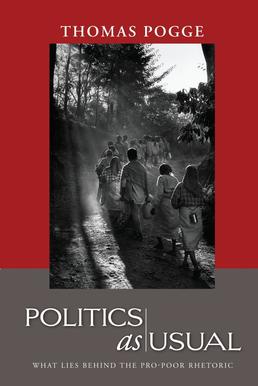Related Research Articles

Citizen's dividend is a proposed policy based upon the Georgist principle that the natural world is the common property of all people. It is proposed that all citizens receive regular payments (dividends) from revenue raised by leasing or taxing the monopoly of valuable land and other natural resources.

Teodoro Obiang Nguema Mbasogo is an Equatoguinean politician and former military officer who has served as the second president of Equatorial Guinea since 3 August 1979. As of 2024, he is the second-longest consecutively serving current non-royal national leader in the world.

Thomas Winfried Menko Pogge is a German philosopher and is the Director of the Global Justice Program and Leitner Professor of Philosophy and International Affairs at Yale University, United States. In addition to his Yale appointment, he is the Research Director of the Centre for the Study of the Mind in Nature at the University of Oslo, Norway, a Professorial Research Fellow at the Centre for Applied Philosophy and Public Ethics at Charles Sturt University, Australia, and Professor of Political Philosophy at the University of Central Lancashire's Centre for Professional Ethics, England. Pogge is also an editor for social and political philosophy for the Stanford Encyclopedia of Philosophy and a member of the Norwegian Academy of Science and Letters.
The resource curse, also known as the paradox of plenty or the poverty paradox, is the phenomenon of countries with an abundance of natural resources having less economic growth, less democracy, or worse development outcomes than countries with fewer natural resources. There are many theories and much academic debate about the reasons for and exceptions to the adverse outcomes. Most experts believe the resource curse is not universal or inevitable but affects certain types of countries or regions under certain conditions.

Global justice is an issue in political philosophy arising from the concern about unfairness. It is sometimes understood as a form of internationalism.
A windfall tax is a higher tax rate on profits that ensue from a sudden windfall gain to a particular company or industry. There have been windfall taxes in various countries across the world, including Australia, Italy, and Mongolia. Following the 2021–2023 global energy crisis, policy specialists at the International Monetary Fund recommended that governments institute windfall profits taxes targeted at economic rents in the energy sector, excluding renewable energy to prevent hindering its further development.

Big Oil is a name sometimes used to describe the world's six or seven largest publicly traded and investor-owned oil and gas companies, also known as supermajors. The term, particularly in the United States, emphasizes their economic power and influence on politics. Big Oil is often associated with the fossil fuels lobby and also used to refer to the industry as a whole in a pejorative or derogatory manner.

XTO Energy Inc. is an American energy company and subsidiary of ExxonMobil principally operating in North America. Acquired by ExxonMobil in 2010 and based out of Spring, Texas, it is involved with the production, processing, transportation, and development of oil and natural gas resources. The company specializes in developing shale gas via unconventional means like hydraulic fracturing and horizontal drilling.
Human rights violations in Aceh, Indonesia occurred in the late 1990s and early 2000s when ExxonMobil hired Indonesian military units to guard their Arun gas field, and these military units raided and razed local villages. Government inquiries have extensively documented these abuses. Victims allege that ExxonMobil knew about the atrocities, which include assault, torture, and murder, and should be liable for them. The company denies these accusations; its primary defense is that the human rights violations which were occurring were not a result of specific intention of the organization and therefore it cannot be held liable.

Presidential elections were held in Equatorial Guinea on November 29, 2009. Teodoro Obiang Nguema, who has been President since 1979, ran for another term and won re-election with 95.8% of the vote, according to official results. Opposition leader Plácido Micó Abogo placed second with 3.6%. However, international observers and the main opposition candidate questioned the legitimacy of this election, noting the poor management which created an unfriendly field for other candidates to take part, media manipulation and the unbalanced results.
Guyana is one of the newest petroleum producing regions in the world, making the first commercial grade crude oil draw in December 2019. Crude oil is sent abroad for refining.

ExxonMobil Corporation is an American multinational oil and gas corporation and the largest direct descendant of John D. Rockefeller's Standard Oil. The company, which took its present name in 1999 per the merger of Exxon and Mobil, is vertically integrated across the entire oil and gas industry, and within it is also a chemicals division which produces plastic, synthetic rubber, and other chemical products. ExxonMobil is headquartered near the Houston suburb of Spring, Texas, though officially incorporated in the U.S. state of New Jersey. It is the largest United States-based oil and gas producing company. ExxonMobil is also the eighth largest company in the world by revenue and the third largest in the US.

The global resources dividend (GRD) is a method of tackling global poverty advanced by the philosopher Thomas Pogge. He presents it as an alternative to the current global economic order. Under the scheme, nations would pay a dividend (tax) on any resources that they use or sell, resulting in a sort of "tax on consumption" Pogge's scheme is motivated by the positive duty to alleviate poverty, but also on the negative responsibility of the rich not to use institutions that perpetuate economic inequality. Pogge estimates that a dividend of just 1% could raise $300 billion each year; this would equal $250 for each individual in the world's poorest quintile.
The Arun gas field is a natural gas field located in the Aceh province on north Sumatra, Indonesia. It was discovered by Mobil Oil Corporation in 1971 and has been described as "the most lucrative LNG operation in the twentieth century." The field began production of natural gas and condensates in 1975.

As the world's largest majority investor-owned oil and gas corporation, ExxonMobil has received significant amounts of controversy and criticism, mostly due to its activities which increase the speed of climate change and its denial of global warming.

Politics as Usual: What Lies Behind the Pro-Poor Rhetoric is a 2010 book by Thomas Pogge. The book is a discussion on issues of global significance and their relationship to poverty. Politics as Usual is based on previously compiled essays. Pogge's book present an alternate view than the one where "Education, health-care, technology, and political participation are becoming ever more universal, empowering human beings everywhere to enjoy security, economic sufficiency, equal citizenship, and a life in dignity." according to Crop. He presents one where Poverty and oppression persist on a massive scale, one where the affluent states and international organizations knowingly contribute and even benefit from these evils.

Political corruption in Equatorial Guinea is high by world standards and considered among the worst of any country on earth. It has been described as "an almost perfect kleptocracy" in which the scale of systemic corruption and the rulers' indifference towards the people's welfare place it at the bottom of every major governance indicator or ranking, below nations with similar per capita GDPs.

From the 1980s to mid 2000s, ExxonMobil was a leader in climate change denial, opposing regulations to curtail global warming. For example, ExxonMobil was a significant influence in preventing ratification of the Kyoto Protocol by the United States. ExxonMobil funded organizations critical of the Kyoto Protocol and seeking to undermine public opinion about the scientific consensus that global warming is caused by the burning of fossil fuels. Of the major oil corporations, ExxonMobil has been the most active in the debate surrounding climate change. According to a 2007 analysis by the Union of Concerned Scientists, the company used many of the same strategies, tactics, organizations, and personnel the tobacco industry used in its denials of the link between lung cancer and smoking.
Equatorial Guinea is a significant oil producer in Africa. Crude oil produced by the country is primarily extracted from the Alba, Zafiro, and Ceiba regions. As a result of the recent increase in the extraction of petroleum, the country's economy has grown significantly. In fact, during the period from 1997 to 2001, the country experienced an average GDP growth of 41.6% per year. However, there have been recent accusations of corruption and repression by the government resulting from the nation's newfound wealth.
ExxonMobil, an American multinational oil and gas corporation presently based out of Texas, has had one of the longest histories of any company in its industry. A direct descendant of John D. Rockefeller's Standard Oil, the company traces its roots as far back as 1886 to the founding of the Vacuum Oil Company, which would become part of ExxonMobil through its own merger with Mobil during the 1930s. The present name of the company comes from a 1999 merger of Standard Oil's New Jersey and New York successors, which adopted the names Exxon and Mobil respectively throughout the middle of the 20th century. Because of Standard Oil of New Jersey's ownership over all Standard Oil assets at the time of the 1911 breakup, ExxonMobil is seen by some as the definitive continuation of Standard Oil today.
References
- ↑ Halperin, Morton (1 January 2005). Protecting Democracy. Lexington Books. p. 25. ISBN 9780739108246.
- ↑ Pogge, Thomas (November 17, 2003). Assisting" the Global Poor. Princeton.
- ↑ Pogge, Thomas. "The Resource Privilege". thomaspogge.com/. Retrieved 1 March 2015.
- ↑ Higgins, Peter (1 August 2013). Immigration Justice. Oxford University Press. p. 41. ISBN 978-0748670277.
- ↑ Lockman-Fine, Tayla. "International Resource and Borrowing Privileges". academicsstand.org/. Archived from the original on 5 September 2014. Retrieved 1 March 2015.
- ↑ Giuseppe, Zaccaria (2002). Internationale Gerechtigkeit und Interpretation = International justice and interpretation. Münster: Lit. p. 77. ISBN 9783825857660.
- ↑ Rasper, Anke (December 7, 2013). "Poverty is a massive crime against humanity". Deutsche Welle. Retrieved 1 March 2015.
- ↑ Schweickart, David (December 2008). "Global Poverty: Alternative Perspectives on What We Should Do-and Why". Journal of Social Philosophy. 39 (4): 471–491. doi:10.1111/j.1467-9833.2008.00438.x.
- ↑ McKinnon, Catriona, ed. (2012). Issues in political theory (2nd ed.). Oxford: Oxford University Press. ISBN 9780199572823.
- ↑ Matthews, Dylan (November 8, 2013). "Americans already think a third of the budget goes to foreign aid. What if it did?". Washington Post. Retrieved 1 March 2015.
- ↑ Frantz, Erica (June 17, 2014). "How oil helps dictatorships survive". Washington Post. Retrieved 1 March 2015.
- ↑ Boyne, Ian (April 10, 2011). "Poverty: A Human-Rights Violation". The Gleaner. Retrieved 1 March 2015.
- ↑ "Exxon Mobil in Africa" (PDF). ExxonMobil.
- ↑ "Unesco suspends Obiang prize". Al Jazeera.
- ↑ Risse, Mathias (28 September 2012). "Do We Owe the Global Poor Assistance or Rectification?". Ethics & International Affairs. 19 (1): 9–18. CiteSeerX 10.1.1.650.4903 . doi:10.1111/j.1747-7093.2005.tb00485.x. S2CID 11650746.
- ↑ Pogge, Thomas (28 September 2012). "Severe Poverty as a Violation of Negative Duties". Ethics & International Affairs. 19 (1): 55–83. doi:10.1111/j.1747-7093.2005.tb00490.x. S2CID 149686283.